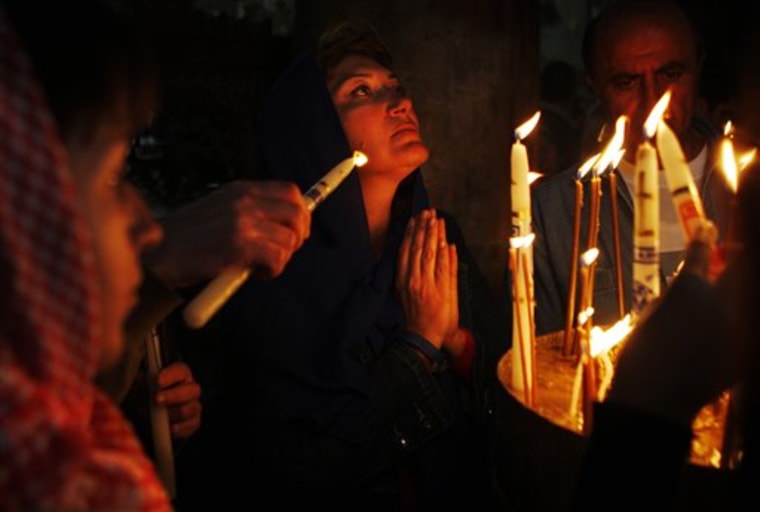Claire Anastas' house is surrounded on three sides by a gray cement wall. Israel's separation barrier has forced the family to close its car repair business because customers can no longer get there.
Now Anastas is using the 30-foot-high wall to make money.
Since October, she has been selling Bethlehem's traditional olive wood carvings on the Internet, and one of her most popular items is a nativity scene with a wall running through it.
Anastas said she designed it and says she has sold 90 out of a stock of 300. "This symbolizes the situation and so they demand it," she said. However, the wall is removable for those Christmas shoppers who want a more festive display.
The wall went up in 2003 — part of a barrier of cement slabs and fences that is to run the length of the West Bank. Two-thirds complete, it was built after suicide attackers killed hundreds of Israelis during Palestinian-Israeli fighting. In two bombings within a month of each other, in nearby Jerusalem in early 2004, 19 Israelis died. The attackers came from Bethlehem.
But the barrier also slices off 10 percent of the West Bank in what Palestinians call a land grab.
The wall not only cuts Bethlehem off from Jerusalem, but meanders through the town to separate Rachel's Tomb, a Jewish shrine, from the rest of the city. Anastas' three-story house is close to the loop around the tomb, and is often visited by foreign sympathizers looking for a vivid view of the wall.
'We feel there's something beautiful left'
Three families used to live in her building, all related. One has emigrated to Jordan, and although fighting has stopped and a fragile peace has descended on Bethlehem this Christmas, Anastas thinks she too might leave with her husband and four children if the financial situation does not improve.
Meanwhile the 39-year-old Christian mother is putting up a Christmas tree, has promised the kids a visit from Santa and on Christmas Eve, will be with her family listening to the choirs in Manger Square.
"These make us happy," she said. "We feel there's something beautiful left."
Several businesses in Anastas' neighborhood shut down because of the wall, but one Christian neighbor, John Hazboun, owner of the Bahamas Seafood Restaurant, saw an opportunity. He painted the menu on the wall.
"I thought of making something positive out of a negative situation," he said. He had shuttered the restaurant in 2000, but reopened in July and says he has bookings for Christmas and New Year's, including tour groups.
He has built a glass-enclosed terrace he calls the "Wall Lounge," and serves a "Wall Chicken Sandwich."
Watchtower
Customers have a view of an Israeli watchtower and wall art, including a painting of a camel with tiny people trying to climb on its back, as though to get over the barrier.
"This reminds us very much of Berlin, where people used to use the wall to make the best of the situation, with paintings," said customer Martin Gehlen, 52, visiting from Cairo where he writes for the Berlin daily Tagesspiegel. "When you enter Bethlehem, you can't miss the wall."
In Beit Jalla, a Bethlehem suburb, the Al Arja textile factory makes organic cotton T-shirts with a "Made in Bethlehem" label. They're a Christian-Jewish-Muslim co-production, in a place where gunmen used to fire on Israeli apartment blocks across the valley.
The more than 800 workers are Christians and Muslims, some of them veiled women, making shirts for the U.S. label "No Sweat." It's owned by Adam Neiman, an American Jewish businessman from Boston.
The operation, part of an anti-sweatshop campaign in poor countries, pays wages ranging from $0.86 to $3.66 an hour for a 48-hour work week with 21 paid vacation days a year, in a city with a 16 percent unemployment rate.
Neiman said the wages are well within the Palestinian pay scale.
"Decent conditions, pay that offers a path to the middle class, no forced overtime, paid holidays — this is a huge step up from the truly brutal sweatshop conditions that these factories must compete with," he said.
He said he chose the factory as a partner because he felt Bethlehem deserved a break.
"The world has gotten a great deal from this town, and Bethlehem hasn't gotten anything back."
Besides, he added, having Muslims, Christians and Jews doing business together is good for peace, because "In order to work with each other, you have to talk to each other."
